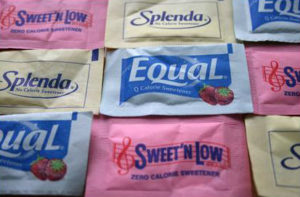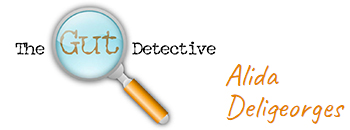
If you haven’t stopped using artificial sweeteners, please do so immediately. Artificial sweeteners have been controversial since they were first introduced to the market in the 1950s, and scientific research shows they are associated with many dangerous side effects.
The 6 Worst Artificial Sweeteners
- Saccharin (954)
Brand Names: Sugarine, Sugarella, Sweet ‘N’ Low, Hermesetas, Sucaryl
In the 1970s, saccharin and other sulphur-based sweeteners were believed to possibly cause bladder cancer. Studies continue to link saccharin to serious health problems, such as kidney lesions, eye deformities, and metabolic disruption. It’s believed to contribute to nausea, digestive upset, photosensitivity, tachycardia and some types of cancer.
Sadly, it’s the primary sweetener for children’s medications such as ‘Panadol’ (excluding 1-5 years/5-12 years colour-free) and ‘Nurofen’, cough syrups, and other over-the-counter and prescription medications.
Saccharin is 300 times sweeter than sucrose. It is also found in tabletop sweeteners (49%), cordials/fruit drinks (31%), carbonated soft drinks (16%), desserts/breakfasts (2%), and jellies/milk-based puddings (2%).
- Cyclamate (952)
Brand Names: Sucaryl
This sweetener is banned in much of the world (including the USA) as it was found to cause cancer among other things.
Sadly, it is still used in Australia.
Cyclamate is 30 times sweeter than sucrose. It is found in cordials/fruit drinks (51%), carbonated soft drinks (34%), tabletop sweeteners (4%), jellies/milk-based puddings (4%), and desserts/breakfasts (4%), and other (3%).
- Aspartame (951)
Brand Names: NutraSweet, Equal, Equal Spoon For Spoon, Hermesetas Gold, Hermesetas Granulated
It’s currently used in more than 6,000 consumer foods and drinks, and over 500 prescription drugs and over-the-counter medications.
Recent studies have found that aspartame may impair memory performance and increase oxidative stress in the brain.
Alarmingly, such studies have also shown aspartame to have carcinogenic effects. As a result, it was recommended that pregnant or nursing women avoid this dangerous artificial sweetener at all costs. It was shown to predispose babies to metabolic syndrome disorders, and obesity, later in life.
Common side effects of aspartame include headaches, migraines, mood disorders, dizziness, and episodes of mania. Comprising of phenylalanine, aspartic acid, and methanol, these substances can stay in the liver, kidneys and brain for quite some time.
Aspartame is 180 sweeter than sucrose. It is found in carbonated soft drinks (66%), tabletop sweeteners (9%), sports, energy and weight management products (7%), flavoured yoghurts/mousses (7%), confectionery (4%), and other (7%).
Interestingly, it is also combined with saccharin in ‘Panadol 7+ Soluble Tablets’ for children, which also includes sodium lauryl sulphate (a known toxin) as a solubilizing agent.
- Sucralose (955)
Brand Names: Splenda
Sucralose was originally introduced as a natural sugar substitute. However, in reality, it’s a chlorinated sucrose derivative. Chlorine is one of the most toxic chemicals on the planet, so this cannot be good at all. It was originally found through the development of a new insecticide compound and wasn’t originally intended to be consumed.
Sucralose has been found to cause problems in the thymus, kidneys, liver, and spleen as well as hormone disruption.
At 600 times sweeter than sucrose, it’s easy to see how the use of sucralose can contribute to an addiction to overly sweet foods and drinks.
Recent studies show cooking with sucralose at high temperature (eg oven) can generate dangerous chloropropanols – a toxic class of compounds. It has also been shown to alter glucose, insulin and glucagon-like peptide 1 levels. Sucralose is nothing short of poison.
It is found in carbonated soft drinks (59%), flavoured yoghurts/mousses (13%), cordials/fruit drinks (9%), tabletop sweeteners (5%), sports, energy and weight management products (5%), and other (9%).
- Acesulphame-K or ACE-K (950)
Brand Names: Hermesetas Gold, Hermesetas Granulated, CSR Smart Sticks, Equal Spoon For Spoon
Composed of a potassium salt that contains methylene chloride, which has been shown to cause nausea, mood problems, possibly some types of cancer, impaired liver and kidney function, problems with eyesight, and perhaps even autism.
The human body can’t break it down, and it’s believed to negatively affect metabolism.
It is often used in combination with aspartame and other artificial sweeteners. In addition to sweetening foods, it’s become increasingly popular as a flavour enhancer. Acesulphame-K is heat-stable and routinely found in highly processed foods and baked goods.
Acesulphame-K is 200 times sweeter than sucrose. It is present in carbonated soft drinks (52%), flavoured yogurts/mousses (22%), cordials/fruit drinks (9%), confectionery (7%), flavoured milk (5%), and other (5%).
It’s worth noting that ‘Panadol Colour-Free’ range (both 1-5 years & 5-12 years) contain ACE-K in combination with sucralose. The range may contain less colouring agents, but they contain more sweeteners than the regular ‘Panadol Elixir’ range (containing saccharin alone).
- Sugar Alcohols
Common Types: Erythritol, Maltitol, Mannitol, Sorbitol, Xylitol and other sugar alcohol that end in -itol
Sugar alcohols aren’t absorbed well by the body and cause an allergic reaction for those who have a sensitivity to it. In addition, it has gastrointestinal side effects that include bloating, gas, cramping, and diarrhoea. Its laxative effect is so pronounced that it’s actually part of the chemical makeup for many over-the-counter laxatives.
It is present in children’s ‘Panadol Colour-Free’ range (1-5 years & 5-12 years both contain maltitol & sorbitol) and ‘Panadol Elixir’ range (sorbitol).
In summary, please avoid ALL these artificial sweeteners. This is especially important for children and women who are pregnant or breastfeeding. The risk is simply too great.
There are plenty of natural, healthy sweeteners available that provide essential nutrients and taste great.
Here Are 6 Healthy Alternatives
- Stevia
Stevia is actually one of the safest sugar substitutes available. In its natural form, it is a herb. Most of what you find in the stores bears little resemblance to a green leafy herb and there are new brands appearing all the time.
‘Sweet Leaf’ is the only stevia-based sweetener that uses only cool purified water and the highest quality stevia leaves in its proprietary extraction process. The result is a pure and sweet tasting stevia – the way it’s meant to be.
The plant-derived sweetness of stevia is 300 times sweeter than sugar. It is available in liquid drops or powder.
- Raw Honey
Much of the honey in stores has been treated and processed destroying much of what is good about honey.
Raw honey is antimicrobial and can be a source of enzymes, vitamins, minerals, amino acids, and antioxidants.
Honey is still a fructose, so it’s best to use no more than a teaspoon a day to not overburden the liver which struggles to metabolize it. Fructose is entirely processed by the liver and when consumed in large amounts, it overloads the liver causing insulin resistance, fatty liver disease, Alzheimer’s disease, type 2 diabetes, and many other problems.
When baking a special treat like some grain-free cookies, I will frequently use 1 tablespoon of honey and 5-10 drops of stevia liquid in place of sugar.
- Maple Syrup
Maple syrup is derived from the sap of maple trees. Unlike refined cane sugar – which undergoes a long, complex process in order to be condensed in crystallized sugar – maple syrup is a relatively a much more natural, unrefined product.
It is antioxidant rich, helping to fight inflammatory diseases such as arthritis, inflammatory bowel disease, and heart disease. It also helps protect cells from DNA damage and mutation, making it a safer sweetener alternative in terms of reducing the risk of developing cancer.
Maple syrup contains zinc and manganese in fairly high amounts, in addition to potassium and calcium. Zinc can help fight illness and improve immunity since it keeps your level of white blood cells up, while manganese plays a role a crucial role in fat and carbohydrate metabolism, calcium absorption, blood sugar regulation, brain, and nerve function.
To keep the digestive tract in healthier shape, free from chemicals and the damage done by a high-sugar diet, maple syrup can be a much better alternative to use.
- Medjool Dates
Dates are loaded with potassium, copper, iron, manganese, magnesium and vitamin B6. From the date palm tree, they are easily digested and help to metabolize proteins, fats, and carbohydrates. Evidence shows that dates may help to reduce LDL cholesterol in the blood and may reduce the risk of stroke.
- Coconut Sugar
Packed with polyphenols, iron, zinc, calcium, potassium, antioxidants, phosphorous and other phytonutrients, coconut sugar is versatile and now readily available. Coconut sugar is extracted sap from the blooms of the coconut and then heated. Next, through evaporation, we get coconut sugar.
Use coconut sugar in your favourite recipes, for it measures just like sugar! It’s a bit more coarse than refined sugar, but that is okay.
- Brown Rice Syrup
Brown rice syrup starts with brown rice that is fermented with enzymes to break down the starch. The liquid is then heated until the syrup consistency is achieved.
The fermented process helps to break down the sugars into ones that are easily digestible. The fermenting process is key – some brown rice syrups are fermented with barley enzymes, meaning it contains gluten. Purchase brown rice syrups that are labelled gluten-free.
Brown rice syrup is the perfect replacement in recipes and can be used as a one-to-one ratio. Use brown rice syrup to make healthy granola bars and granola, nut clusters, and to sweeten nut and fruit pies.
Summary
Keep in mind that because consuming too much sugar, from any source, is one of the leading causes of some of the most widespread health problems – even natural sweeteners should be used in small amounts.
When it comes to solutions for reversing diabetes naturally or other blood-sugar related conditions, it’s best to minimize sugar intake overall and especially to avoid refined sugar and artificial sweeteners.
**If you’ve got this far – thank you for reading and I look forward to bringing you more information in the future.
Now, enjoy some much needed inspirational music…
